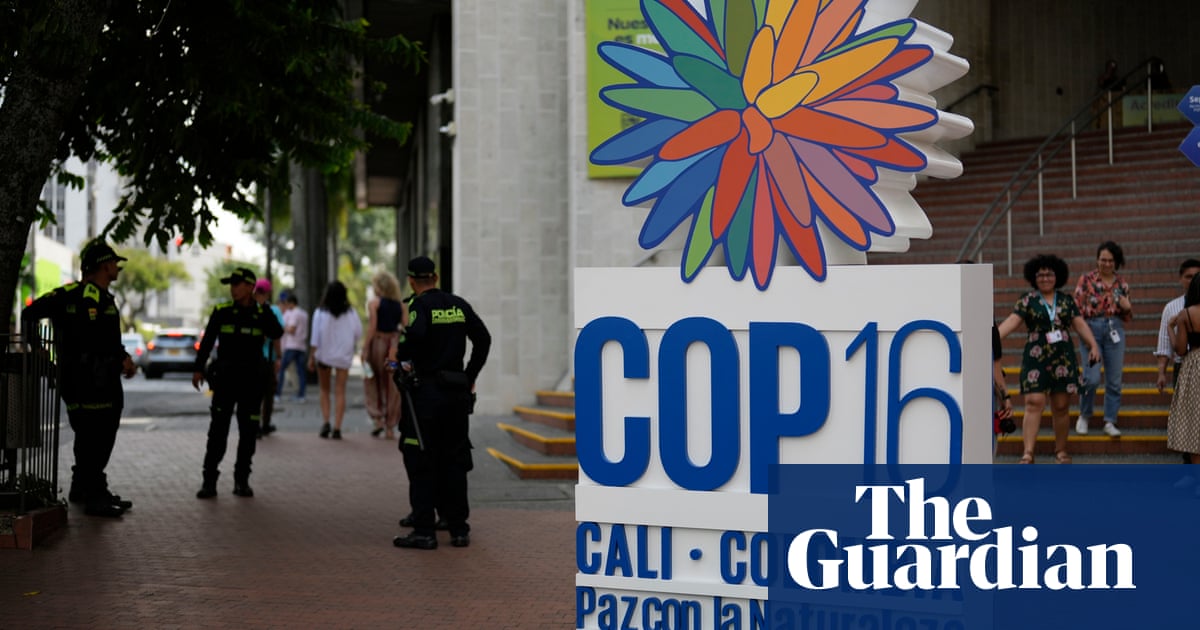Cop16: Colombia prepares to host ‘decisive’ summit on biodiversity | Cop16

World leaders, environmental activists and prominent researchers have begun to arrive in Cali, Colombia, for a biodiversity summit that experts say will be decisive for the fate of the world’s rapidly declining wildlife populations.
The host nation is also hoping that the summit, which formally opens on Sunday evening, will be the most inclusive in history.
“One of Colombia’s objectives is that this is recognised globally as the Cop of the people, where citizens, afro-descendant and campesino communities, Indigenous peoples, scientists, social actors and all sectors are heard and have a broad participation in the discussions,” said Susana Muhamad, Colombia’s environment minister. “This means managing to mobilise the entire government and society in order to contribute to the care of biodiversity.”
The Cop16 UN biodiversity summit is expected to welcome 190 countries and 15,000 people with the goal of protecting the world’s flora and fauna. Ecologists warn ecosystems are reaching an inflection point where the extinction of species could begin to accelerate.
Gustavo Petro’s government is pushing for Indigenous people to have more of a role in protecting Colombia’s ecosystems and has said they will be at the centre of Cop16.
The environment ministry announced earlier this week that it will create Indigenous-led environmental authorities with public powers that settle Colombia’s “historical debt” with native communities.
Indigenous groups have praised the move to empower them to defend their ecosystems.
Some, however, have less confidence in Cop16’s promises of inclusion, including the creation of an area known as the green zone, which civil society groups, the private sector and the general public are being encouraged to attend. The green zone will host 1,000 events, including panels, workshops and musical performances, from 21 October to 1 November.
Harol Ipuchima, representative of Colombia’s Indigenous groups at Cop16 and the leader of the Maguta people in the Amazon, said the government’s narrative of inclusivity distracted from the fact that Indigenous peoples still have no significant involvement in the world’s decision-making process on the environment.
“It sounds nice but it is all superficial, really,” he said. “Out of everyone in the entire world, we are the ones who are the most knowledgable about conservation and how to live in harmony with our ecosystems, yet we remain observers. We are still in the same position as we have been for decades where we have to shout at politicians to protect the environment but have no vote.”
Making the Cop16 open to everyone could be a powerful way to engage those who are concerned about the global decline in biodiversity but do not know how to do something about it, said Ximena Barrera, director of government affairs and international relations at WWF Colombia.
“Our surveys show that 46% of Colombians are worried about the state of natural resources and seven out of 10 would like to take action to reduce biodiversity loss. This is an incredible opportunity to educate and mobilise them to protect the environment,” she said.
Cop16 is the first time countries will meet to discuss global biodiversity since the Kunming-Montreal agreement in 2022 when world leaders made a series of unprecedented pledges to protect the natural world.
Ecologists say the number of the world’s animals, plants, fungi and microorganisms are collapsing under the pressures of deforestation, pollution and the climate crisis.
Only 10% of the 196 parties who signed the 2022 agreement have since released the nature action plans they agreed to deliver in China, funding is well short of the $20bn a year needed to protect nature and only 2.8% of the world’s ocean is protected “effectively”.
With WWF warning that collapsing wildlife populations are near the “point of no return”, environmental activists and researchers say Cop16 is a critical opportunity for politicians to get the world back on track.
“The world agreed on an ambitious plan to safeguard our planet’s biodiversity. In Cali, countries now need to translate this ambition into concrete action,” said Loreley Picourt, executive director of the Ocean and Climate Platform, an NGO advocating the protection of the world’s seas.
Representatives will try to thrash out global budgets for protection of nature and create a mechanism to ensure countries hold to their word on protecting the world’s forests, rivers and oceans.
“Colombia is a perfect country to host a nature Cop. Not only is it home to incredible biodiversity and natural habitats, it is playing a leading role in demonstrating how conservation works for nature and people,” said Gavin Edwards, executive director of nature positive initiative secretariat, a coalition of conservation organisations. “However, in the midst of global elections, other key conferences and pressing issues of national and international security, this UN biodiversity conference is vying for attention on the global stage.”
Source link




